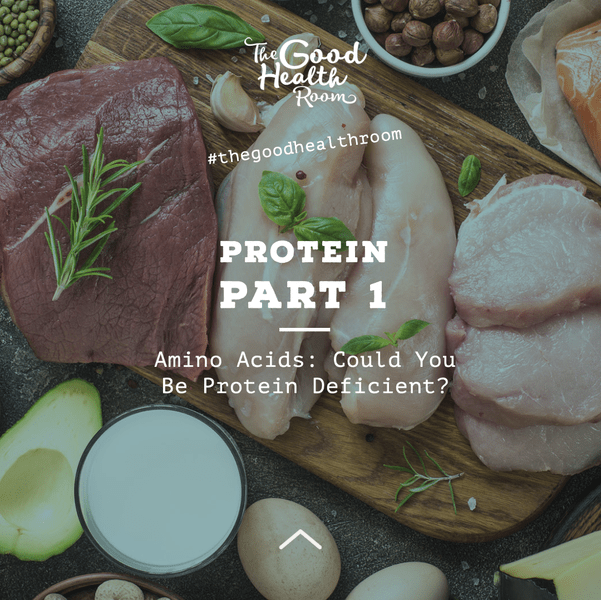5 Key Points to Take Home
- Chemical and traumatic stressors can harm and damage our protein structures
- Protein deficiencies (see list below) can cause health imbalances, symptoms and can been linked to some major health concerns.
- Vegans and vegetarians require supplementation of amino acids to avoid cellular health breakdown within the body
- Learn the basics of protein – essential and non-essential amino acids
- Protein consists of a long-coiled chain of amino acids which are molecules made of carbon, hydrogen, oxygen and nitrogen.
READ THE FULL ARTICLE BELOW |
|---|
AUTHOR: Shona Mackenzie
Could You Be Protein Deficient?
Daily, our bodies experience wear and tear due to chemical and traumatic stressors, which harm and damage our protein structure. Our cells regularly need to repair proteins to maintain good health. These stressors are hostile to our body’s cells – they can be heat, sweating, salt balance, hormonal support, or energy production. Other stressors can be work deadlines, disharmony at home with a spouse/child, medications (chemical stressors), environmental pollutants in our food and drinks e.g., pesticides, herbicides.
Protein deficiencies can lead to your body’s inability to handle these stressors and therefore can cause health symptoms.
What Could A Protein Deficiency Look Like?
- Decreased body protein turnover
- Immune dysfunction
- Slower gut-lining healing
- Decreased organ mass
- Muscle wasting
- Bone loss
- Delayed healing
- Connective tissue loss (e.g., skin, hair, nails)
- Lower neurotransmitters e.g., mood – serotonin
- Loss of training effect in athletes or injury
- Lowered hormones
- Lower enzyme levels with reduced liver detoxification and energy production
Health Concerns That Can Be Linked To Protein Deficiencies
- Multiple chemical sensitivities e.g., perfumes, smells, synthetic fabrics, Wi-Fi, heavy metals, pesticides, herbicides
- Fibromyalgia
- Chronic Fatigue Syndrome
- Anxiety and depression
- Osteoporosis
- Autoimmune – Lupus, Rheumatoid Arthritis
- Sleep disorders
- Parkinson’s Disease
- Lyme Disease
- Alzheimer’s / Dementia
- Immune health
Understanding Basic Protein Knowledge
Protein (amino acids) are the building blocks of life. They make up the structure and enzymes systems in the body. Enzymes facilitate important tasks within our bodies e.g., energy production, building muscle, destroying toxins, breaking down foods during digestion, DNA production, tissue repair and for every function of the body.
Protein consists of a long-coiled chain of amino acids which are molecules made of carbon, hydrogen, oxygen and nitrogen. They can be mixed and matched with each other in 22 different ways, and the chains can be made up of a wide number of amino acids.
| AMINO ACIDS CONSIST OF: | ||
|---|---|---|
8 essential amino acids (EAA) – we MUST get these from food as the body is not able to make them, and 14 non-essential amino acids.
Essential Amino Acids:
- Methionine
- Leucine
- Isoleucine
- Phenylalanine
- Lysine
- Valine
- Threonine
- Tryptophan
14 non-Essential amino acids are made from the 8 essential amino acids!
Non-Essential Amino Acids
Elderly and children require these (#9 & #10) so are sometimes considered ‘essential’ in some textbooks:
9. Histidine
10. Arginine
11. Alanine
12. Asparagine
13. Aspartic acid
14. Cysteine
15. Glutamic acid
16. Glutamine
17. Glycine
18. Proline
19. Selenocysteine
20. Serine
21. Tyrosine
EAAs make up approximately 50% of our body’s protein – except for collagen, as it does not contain tryptophan. Collagen only contains 4 non-essential amino acids. See our blog on Collagen.
WHERE TO NEXT:
Let us teach you more about the vital role of amino acids (protein) for optimal health and how to achieve it. Support for regenerating your health in areas of weight, skin, energy, depression, insomnia, and osteoporosis.
CONTACT US for a free quick chat to check if you may be protein deficient or BOOK so we can teach you what is the best approach to support this!
Coming soon: The Role of Stomach Acid & Enzymes: Your Quick Guide to Protein Digestion. (PROTEIN PART 2)
| REFERENCES | ||
|---|---|---|
Minkoff, D., (2019). The Search for the Perfect Protein; The Key to Solving Weight Loss, Depression, Fatigue, Insomnia, and Osteoporosis. Lioncrest Publishing.





